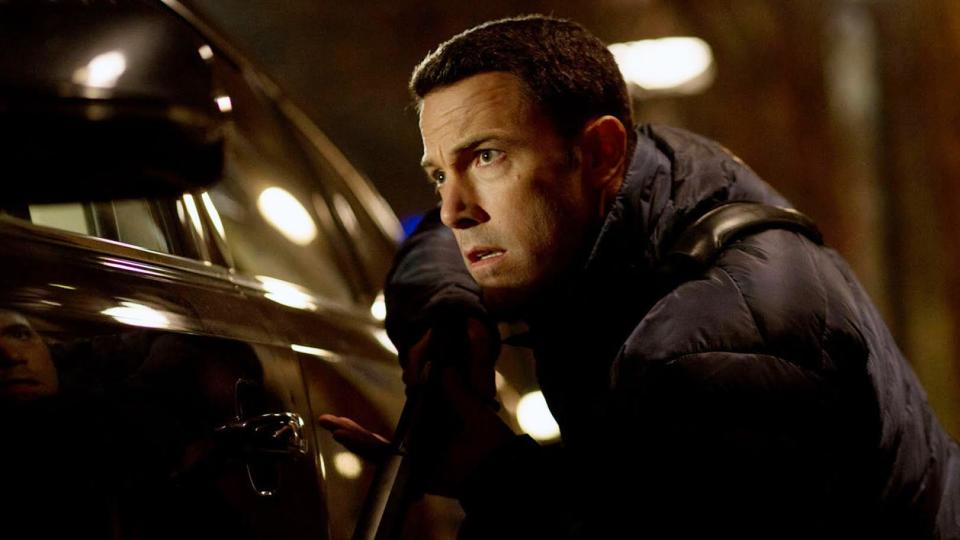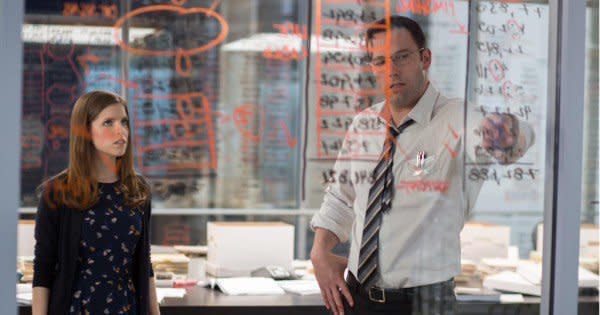‘The Accountant’ Composer Mark Isham On The “Mathematical Beauty” Of Film’s Score

Director Gavin O’Connor’s The Accountant follows the adventures – or misadventures – of an autistic math savant (Ben Affleck) who, using the cover of an unassuming small town CPA, earns a living as a forensic accountant for some of the world’s most dangerous criminals. And also happens to be a brutally efficient trained killer whose skill with numbers is matched only by his skill at dispatching enemies. Currently winning the weekend with a projected three day cume of $25 million and an A Cinemascore, The Accountant is a fascinating take on its genre, providing not just thrilling violence but a sincere look at how a character finds a way to thrive with his condition through complex calculations, be they mathematical or simply how many bullets to put in someone.

That dichotomy is supported by the haunting, minimalist and at times, positively anxiety-inducing score by composer Mark Isham, a sample of which you can listen to above. A prolific film scorer whose credits include Reversal of Fortune, Point Break, From the Earth to the Moon, Crash, The Bad Lieutenant: Port of Call New Orleans and ABC’s American Crime, The Accountant is Isham’s fourth collaboration with O’Connor, following 2004’s Miracle, 2008’s Pride and Glory, and 2011’s Warrior. With The Accountant now in theaters, Isham spoke to Deadline about his relationship with O’Connor, how the film’s main character informed his score, the math behind his music, and more.
Deadline: Your score is understated at times and other times incredibly unnerving – in a good way. How did you settle on that tone?
Isham: I think the thing that’s really unique about this film is the character. He’s got what could arguably be described as two sides to him that evolved very naturally – his experience and his life. They are part and parcel to how he views life, he has a very clear sense of his moral code, and he’s used to dealing with people with, shall we say, very questionable moral codes. He has typical responses for them, and holds himself to a very high standard of morality and ethics. So it contributes to this fascinating character.
So I chose this because there is a beauty in his mind with mathematics and patterns that he’s always experienced, and it’s plagued him as a problem. And when he embraces it, it’s true beauty for him. So there is a great deal of the score that embraces the beauty of mathematics, and of course there’s a great deal of mathematics in music itself. So some of the more electronic elements of the score really try in a non-intrusive way to make the mathematical beauty of patterns part of the fabric of the sound.
Deadline: About that mathematical element, were you thinking about your score in that Pythagorean way, mathematically derived harmonies for instance? How do you incorporate math into your music?
Isham: I don’t dwell on it 90% of the time. Obviously there’s a music that’s evolved over the last 30, 40 years, minimalism, and a lot of it comes from early sequencers developed in the 60s, and the classical guys who got ahold of those concepts and played around with them. There’s a great deal of pure math in rhythm, so when I’m dealing in that style, I do absolutely think of the math of it. And in this particular case I did. I actually worked out various patterns. Once I’ve done that, I try it, and then see if it’s a pleasing effect – the aesthetic choice is always the final choice. I don’t drive it with pure math all the time, the math has to come from a place of ‘oh my goodness, that has that effect, cool. I like that, I want to use that.’
Those are sort of the simple concepts I used to build the texture behind the score. But having said that, there is a huge emotional component to this story. The real part of the story is the heart of it. And that is what Gavin O’conner is so brilliant at. one of the greatest directors I think at really building to such a heartfelt climax with his characters. He did it in warrior, and I think he’s done it here equally as well perhaps better.
And consequently you have to drop the patterns and all the intellectual gobbledegook and you have to read into your roots as a composer of pure, heart-driven emotion, find whatever those things are. To me that’s really based on harmony, understanding how harmony can draw you to an emotional climax, and then find the type of melody that a film like this will support.
Deadline: What did you use for the score of The Accountant?
Isham: Organically, we used orchestra, solo cello, choir, percussion. I think that’s it in the acoustic realm. Then there’s a lot of electric piano, and a tremendous amount of sampled sounds, so there’s a great organic quality to the electronic sounds. There was a very specific point where I wanted sounds that were obviously electronic as well, to blend into the score. Some of that came off the back wall – my collection. My old Moog 15, my Arp 2600. The problem for this is in film the new cut comes in and suddenly a piece has to be 10 seconds shorter or 15 seconds longer, so it becomes a little easier to stay in the computer environment.
Deadline: There has been a lot of discussion about the main character, that he’s someone on the Autism spectrum. Did knowing that this character is somewhere on that spectrum influence the way you approached your score?

Isham: There’s no comment in the score about that condition as a social phenomenon, I kept it related to his emotions. The comment the score makes is that when [the main character] is accounting something that is truly challenging, he is in heaven. The beauty of that abstractness enchants him, he’s literally the happiest he could be. When he feels something for someone, it’s genuine, his heart is genuinely touched. He also deals with difficulty in verbal communication. That difficulty is nothing that any teenager hasn’t experienced [though]: you want to talk to the girl, you want to talk to the boy, somebody that you’re uncomfortable talking to. These are very universal emotions.
Deadline: You’ve worked with Gavin four times now. Can you talk about how that relationship has developed over the years?
Isham: I consider Gavin a good friend. We hit it off obviously on our first meeting, and stayed good friends and collaborators since. I think it’s because we share a lot of the same interests in life, we both know what those family moments are, the value of that, and stories about that are meaningful for both of us. I think we sort of cut our teeth together, [Miracle] was his first large feature, and a large orchestral score which for me is always a challenge. Not that I hadn’t touched on a film like that before but every film is unique. We went through a learning process together. Any time you come out of the trenches with someone so to speak with someone who you really respect and get a real love for, it builds a relationship you want to keep going with.
Deadline: How soon into production were you able to begin creating your score?
Isham: The beauty of working with someone on a regular basis is that you do get an early start. Gavin and I met up when the script was greenlit to talk about the character. He also said ‘I have no idea what the music should be’ and so we had a long time to germinate on this. And quite frankly of the four films we’ve done, this was the hardest in that respect, I don’t think either one of us had a clear idea of what the music could and should and would be, and so the temp process was helpful.
Deadline: There’s been a lot of discussion this year about the increasing use of temp scores and how they impact new music for film. Do you feel temp scores are helpful, or is it something you’d prefer not to use?
Isham: Temps are interesting because they’re just a vehicle for that first preview, [but] they can really help you find where you can go. In this case, I wrote a lot of music that didn’t see the light of day because it was wrong, but I could do that for a lifetime probably if we hadn’t also been temping.
I’ve had an evolving relationship with temp scores. I think a lot of it has to do with the director’s confidence in music. Certainly some directors just want to learn themselves what the score is through the temp score, and I understand that. The key there though is that they’re able to divorce themselves from the specifics of the temp as the score emerges. But over the decades what I’ve learned is how to help a director do that. That transition can be seamless, and part of the great thing about technology these days the demos [for the original work] can be very high quality. So I’ll make my demos at the quality they can go into the preliminary screenings.
Deadline: How did that work with The Accountant?

I think the first Accountant preview, it was mostly all temp, because of the nature of still exploring where we were going. But by the second preview it was 60% me. You can start to see, to learn to love the approach that the producers and directors are helping to find with me. You just have to work as a group to achieve that, and it takes some communication. And that’s one thing I love about working with Gavin, he’s a great communicator. If there’s anything on his mind it’s out in the open, and we sort it out.
So I think temp scores are helpful, certainly on films trying to be more adventuresome, musically, and not just cutting in the latest trend. So I find ultimately I would rather have a temp than no temp. Having said that, there are definitely times when I sit down to watch a movie with no music at all, and let it get in my head and just say ‘ok what would happen if?’
[youtube=https://www.youtube.com/watch?v=rBbK-6yhMz8&w=605&h=340]
Related stories
'Inferno' Ignites With $50M Offshore; 'Miss Peregrine' Tops $130M - Intl Box Office
'The Accountant' Calculates $24.7M Opening; 'Max Steel' Rusts - Sunday B.O. Postmortem
'The Accountant' Review: Ben Affleck Kills In Entertaining Action Flick
Get more from Deadline.com: Follow us on Twitter, Facebook, Newsletter

